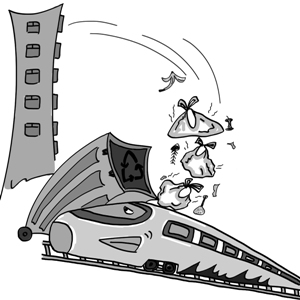
 |
| Illustration: Chen Xia/GT |
Two months ago, a photo of six foreigners urinating on an elevated highway in downtown Shanghai was widely spread online. Local media, including our weekly column, reported and commented on it. Two of the men involved who are still residing in the city - one German and one Danish - were fined 100 yuan ($16.31) each by local urban management officers, or chengguan, reported the Oriental Morning Post on Wednesday.
The other four have already left China, so the punishment can't be implemented. Although some netizens said the fines were too light, local urban management officials said that, according to city regulations, acts including spitting, urinating and defecating in public places can entail fines of up to 200 yuan, which applies to both foreigners and Chinese. Local media also reported that one Chinese driver was also caught urinating on an elevated road by surveillance cameras. He was tracked down via his car plate number and fined 100 yuan.
This issue of determining appropriate and fair penalties reminds me of the delays on the metro in Shanghai on Monday caused by trash being dumped on the line, and the recent hoax bomb threats targeting airlines nationwide.
The metro Line 3 had to halt operation for 24 minutes when a train caught fire and experienced a mechanical failure after it was hit by a large bag of trash thrown from a high-rise building next to an elevated portion of the track. Authorities reported a resulting economic loss of at least 100,000 yuan. An industry insider told me the figure is based on the cost of spare parts, labor and other related fees.
According to rail transport regulations, a person caught tossing trash or other items on a metro train or the track faces a maximum fine of 100 yuan. If any economic loss is caused then the person should also be responsible for civil liability and economic compensation.
An administrator with the rail transport authority told me that it's hard to catch such people in the act, so on many occasions the metro operator or the insurance companies have to foot the bill. So realistically, we have to admit that punishment can't solve the problem.
The problem can only be curbed by increasing people's sense of civil behavior and responsibility. The same is true with the issue of people urinating in public places such as street corners, the city's elevated ring roads and even the nation's expressway network. I always felt embarrassed when my little daughter pointed at someone urinating on the street and asked, "What's that man doing?" Now my daughter has grown to be a teenager, she doesn't ask any more. But there are many more parents of young children facing the same awkward situation I faced. It's impossible to station law enforcement officials on every corner of Shanghai's streets to catch "the uncivilized" in the act. It's also impossible to fix enough cameras to cover all the slipways on elevated roads.
Let's turn to the airline bomb threats. A number of flights were delayed, canceled or even forced to make emergency landings because of the calls. Luckily, they were just hoaxes. According to previous news reports, those responsible for similar calls in the past have been given jail terms of between four and 15 years.
China's criminal laws see bomb hoaxes as severe disturbances to social order, and as such recommend prison terms of one to five years. In cases where judicial authorities determine that a hoax has had particularly severe consequences, jail terms of up to 15 years are allowed. But just what constitutes "severe consequences" is ambiguous and open to interpretation. Thus, the public questions why jail terms can vary from as short as four years to as long as 15 years for the same crime.
Experts urge joined-up efforts to prevent similar cases from happening again. Routine propaganda campaigns across various arms of the media should aim to enhance civility, while technical measures to detect and catch "bad guys" must be improved. Penalties - both financial and custodial - should be imposed to encourage the general public to respect the law.
I'd like to add one more thing that is also important. Standardized and transparent criteria for imposing penalties should be made public. The more detailed the criteria are, the better. As a result, equality in the eyes of the law can be respected and upheld.
Under such a framework, people will be aware of the consequences of violating the law and only act in an uncivil manner if they are really determined to challenge the legal system. When the judicial results are announced in such cases, the public and involved parties will be able to accept the expected results.
So next time, if a person wants to pee in public, he'd better check his pocket first to see if he has 100 yuan.
















 Couple say 'I do' after 35-year wait
Couple say 'I do' after 35-year wait


![]()
